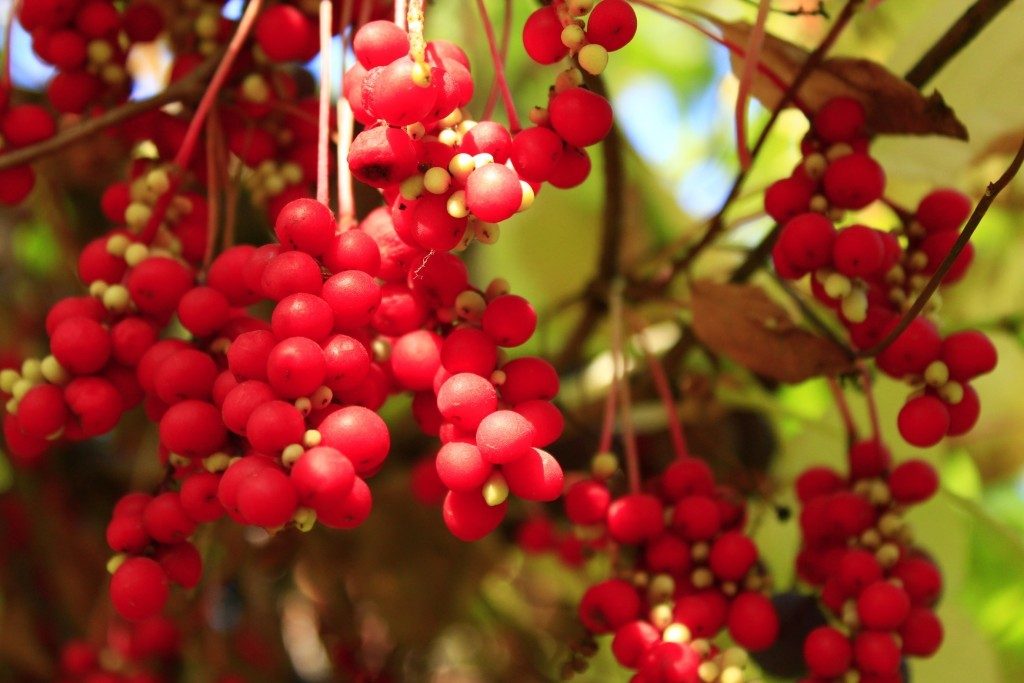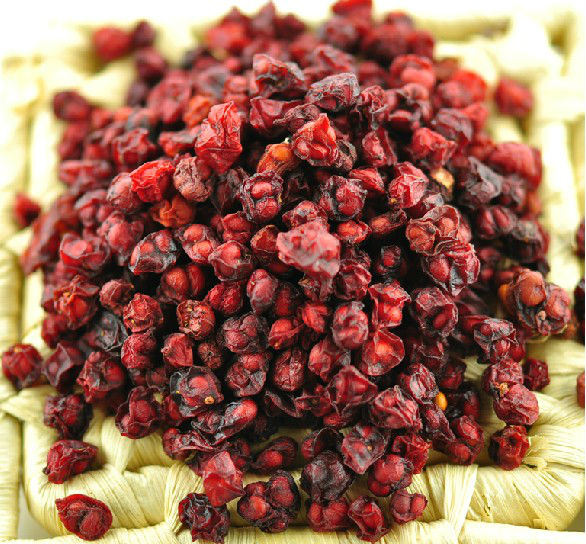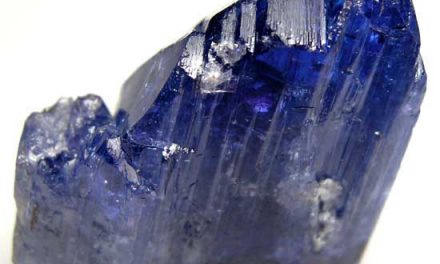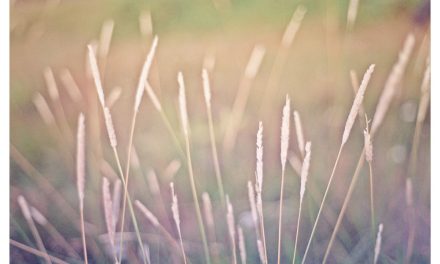Herban Love with Goldthread Herbs | Schisandra Berry


Schisandra berry (Schisandra Chinensis)
Family: Magnoliaceae
Taste: Sour, bitter, pungent, sweet, salty
Temperature: Warm
Herbal Actions: Adaptogen, Nervine, Astringent, Expectorant, Antioxidant
Schisandra and our current herbal health trends:
Schisandra berry, or Wu Wei Zi, is known as the five flavor berry according to Chinese Medicine, because it is said to contain sweet, bitter, pungent, salty, and sour tastes. According to the principles of natural medicine, each of these flavors has a specific function in the body, and consuming them on a regular basis helps to maintain optimal physiological balance. The modern diet is often lacking in several of these flavors, which makes Schisandra berry a versatile and healthful addition.
At one level, it is a berry that contains many healthful compounds that provide the building blocks for quenching free radicals, which over time cause the ubiquitous inflammatory processes that degrade tissues and weaken organ functioning. We could all benefit from having more of these superfruits in our diet. Most of what we consider fruit is actually quite sweet and hybridized over millennia to optimize order, to optimize the sweet contents at the expense of their nutritional aspects. The predecessors of our modern day strawberries and big luscious grapes were berries similar to Schisandra, that have potent tastes and are dense with nutrition. They cannot be snacked on in the same quantity as the fruit we commonly eat, due to their strong tastes and potency, yet if eaten in small amounts their benefits are consistently remarkable.
Much of what natural medicine has to offer is a return to the slow drip approach to health maintenance and optimization. It is the little things we do on a daily basis that slowly add up to create the conditions within which health is created. Herbal medicine is often looked upon as some kind of exotic and/or highly specialized approach to healthcare. It is currently quite heavily associated with high-powered supplementation in the form of expensive, highly processed, fractionated products barely resembling the original plants from which they were obtained. The roots of herbal medicine, however, are to be found in the simplicity of the kitchen and garden.
Schisandra is a versatile herb with a wide variety of medicinal applications based upon its five distinct tastes and the energies that they catalyze within physiology. According to Chinese medicine, it is said to consolidate the kidney, lung, and liver energy via its sour astringency. This taste is the most prevalent in Schisandra and provides clues to many of the classic indications for this herb. According to TCM, the sour taste has a tonic energy that strengthens organ function and prevents leakage of vital energy. One of the chief functions of Qi in the body is to contain energy and vital essences. When this function is deficient within a particular organ system leakage of essence often takes place in various ways depending upon the affected tissue. For example, the kidneys are responsible for consolidating the water energy in the body. When they are weak, vital fluids are lost, resulting in symptoms such as hormonal sweats, spermatorrhea, enuresis, and Leukorrhea. The nature of the fluid lost depends upon the overall physiological balance of the individual and can be considered both a symptom and a further cause of the imbalance. The net result of long-term leakage of water energy is Yin deficiency and dryness, which further weaken the system and predispose it too inflammatory changes. Water energy is a cooling, lubricating, and nourishing force that balances the heating, active, and metabolic aspects of physiology. When fluids are inappropriately leaking from the body in any form, the resulting depletion will be felt throughout the entire system. So, long-term night sweats, for example, could lead to dried out mucous membranes or skin over the long term. Schisandra berry in formula can arrest the leakage and in combination with other herbs assist with the resulting heat and/or deficiency.

The respiratory system is also strongly benefited by Schisandra berries’ unique properties. In TCM the lungs are in charge of exhalation while it is the kidney sphere that grasps the Qi upon inhale allowing for oxygen and vital energy to be integrated into the system. In conditions such as asthma or chronic bronchitis with underlying kidney deficiency, there is an inability to hold the inhalation, and resulting cough, wheezing, and shortness of breath are often the result. Schisandra increases the bodies’ ability to grasp the inhalation and reduce the above symptoms. Wheezing can be viewed as yet another manifestation of energy leaking out of the body, this time in the form of air element or vital gasses instead of fluids. Here, Schisandra’s consolidating effects apply to a different substance and function.
Heart stuff:
Schisandra berry is also indicated for aspects of the heart system in TCM. This is closely correlated to the nervous system in western physiology as well as certain aspects of consciousness, such as memory, cognition, and concentration. Disturbances in this system can manifest in a variety of ways, and Schisandra could be considered a trophorestorative to the nervous system in general. According to TCM, it is “calming to the spirit”, and is indicated for anxiety, palpitations, insomnia, and lack of focus. At the same time, it has the ability to lift up depleted energy in conditions characterized by deficiency, such as depression, apathy, poor memory, and exhaustion. This constellation of symptoms known as neurasthenia is very well suited to Schisandra’s combination of qualities. It could be thought of as astringing the leaking mental energy to prevent further energy loss through hyperactive and unstable thought. It is also providing many of the core micronutrients and subtle chemical catalysts that are required to maintain the foundational metabolic energy upon which a stable mind rests. Taken over time, Schisandra can help stabilize the nervous system, allowing for a general re-calibration and optimization of the mental faculties. Its action helps to recalibrate and restore the subtle interplay of Yin Yang energies of stimulation and rest throughout the nervous system.
According to more contemporary research, Schisandra is a unique hepato-protector in the same class as herbs such as Milk thistle, Turmeric, and Picrorhyzzia. This system is essentially the cooling, Yin aspect of liver function that quenches inflammatory by-products created during the more dynamic and heating first phase detoxification processes. It is useful for any condition characterized by inflammatory irritation and deranged function of the liver system. Chronic issues such as Hepatitis and Cirrhosis will be benefited by taking Schisandra alone or as part of a formula to slow down and in some cases reverse pathology stemming from these issues. Likewise, Schisandra is a smart choice for anyone that is susceptible or at risk of liver weakness and inflammation due to various lifestyle factors. Smoking, over-consumption of alcohol, pharmaceutical drug use, occupational exposure to solvents and other potentially toxic substances, are a few examples of where Schisandra berries benefits can play a vitally important role. Finally, we do now inhabit a world that is generally more taxing to the body in a multitude of ways and often it is the liver that bears much of the burden. Schisandra is balanced enough in its profile of effects that it can be used over time to gently potentiate and optimize the functioning of this vital organ.
The doorway for many into the remembrance and re-integration of herbal medicine into daily life is the spice rack.

Introduce Schisandra into your diet with Goldthread Herbs and their Schisandra Supreme tonic.








